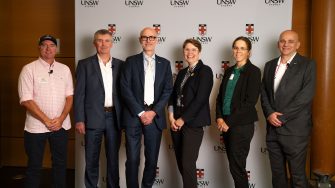UNSW Dean of Science, Scientia Professor Sven Rogge, also spoke at the event. He says he believes partnerships between academia, not-for profits, industry, government and corporate Australia are “critical to the understanding of science as the solution to the world’s most important issues”.
The initiative has also included UNSW Science commissioned research surveying Australian business leaders. The results uncovered:
- More than 8 in 10 business leaders believe investing in science could solve challenges faced by their organisation in the next five years
- 1 in 4 Australian businesses do not invest in research and development (R&D)
- Australian businesses invest less than 7 percent of their annual turnover into research and development, with around a quarter not investing in science at all.
A UNSW and industry partner panel discussion led by the ABC’s Ann Jones featured real-world examples of just how a UNSW Science partnership can improve and effectively deliver positive impacts across society, the economy and the environment.
The UNSW Science Co-Deputy Dean for External Engagement, Professor Jes Sammut, stressed the importance of trusted relationships in building his own research collaborations, and how this is key to improving lives and livelihoods.
“To make societal impact, you need to work with society,” says Professor Sammut.
His current work in Papua New Guinea (PNG) in this film case study is an example of what can be achieved with multidisciplinary efforts across various agencies, NGOs, and governments in both Australian and PNG, in partnership with local community programs.
Founder and Director of Kandui Technologies Pty Ltd, Andrew Douglas, spoke about his unique relationship with Scientia Professor Veena Sahajwalla and the UNSW SMaRT Centre and Shoalhaven City Council. Together, they turn low-value materials like waste glass and textiles into high-performing and high-value products such as ceramic tiles and benchtops, as shown in this film case study.
Douglas’ stories of shared values between the university and partners spoke to the heart of successful collaboration. And, while partnerships can take time to develop, much more can be realised, elevated and accomplished together—especially when ‘fun’ is part of the equation.



